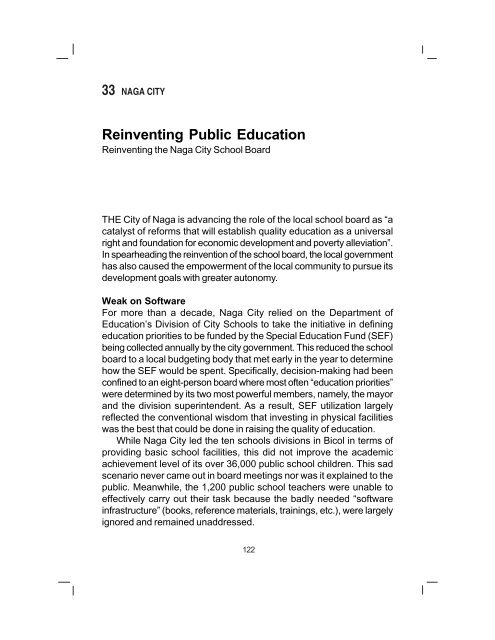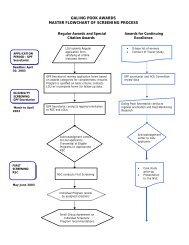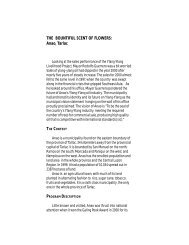kaban galing - front cover - galing pook
kaban galing - front cover - galing pook
kaban galing - front cover - galing pook
You also want an ePaper? Increase the reach of your titles
YUMPU automatically turns print PDFs into web optimized ePapers that Google loves.
33 NAGA CITY<br />
Reinventing Public Education<br />
Reinventing the Naga City School Board<br />
THE City of Naga is advancing the role of the local school board as “a<br />
catalyst of reforms that will establish quality education as a universal<br />
right and foundation for economic development and poverty alleviation”.<br />
In spearheading the reinvention of the school board, the local government<br />
has also caused the empowerment of the local community to pursue its<br />
development goals with greater autonomy.<br />
Weak on Software<br />
For more than a decade, Naga City relied on the Department of<br />
Education’s Division of City Schools to take the initiative in defining<br />
education priorities to be funded by the Special Education Fund (SEF)<br />
being collected annually by the city government. This reduced the school<br />
board to a local budgeting body that met early in the year to determine<br />
how the SEF would be spent. Specifically, decision-making had been<br />
confined to an eight-person board where most often “education priorities”<br />
were determined by its two most powerful members, namely, the mayor<br />
and the division superintendent. As a result, SEF utilization largely<br />
reflected the conventional wisdom that investing in physical facilities<br />
was the best that could be done in raising the quality of education.<br />
While Naga City led the ten schools divisions in Bicol in terms of<br />
providing basic school facilities, this did not improve the academic<br />
achievement level of its over 36,000 public school children. This sad<br />
scenario never came out in board meetings nor was it explained to the<br />
public. Meanwhile, the 1,200 public school teachers were unable to<br />
effectively carry out their task because the badly needed “software<br />
infrastructure” (books, reference materials, trainings, etc.), were largely<br />
ignored and remained unaddressed.<br />
122












![[Year] Paano Tayo Aasenso? - Galing Pook Foundation](https://img.yumpu.com/3809385/1/184x260/year-paano-tayo-aasenso-galing-pook-foundation.jpg?quality=85)